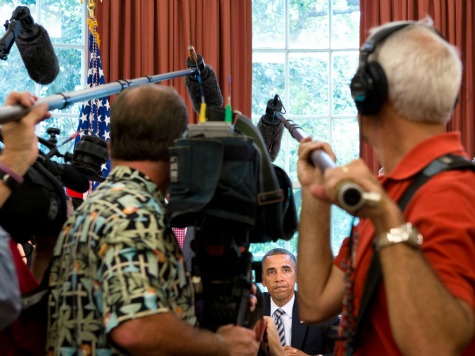Throughout the fight over Chuck Hagel’s nomination as Secretary of Defense, a devoted group of pro-Hagel journalists has been determined not only to defend Hagel, but to attack his critics and their credibility. They have gone beyond the “normal” mainstream media bias, which for most outlets merely meant ignoring flaws in Hagel’s record and his refusal to disclose key information. “Team Hagel” has even ignored its own scoops.
For example, BuzzFeed was the first outlet on Feb. 14 to recover and post the prepared text of a controversial speech that then-Sen. Hagel delivered at Rutgers University in March 2007. (The controversy surrounds remarks allegedly made by Hagel about Israel in the question-and-answer session that followed.) BuzzFeed editor-in-chief Ben Smith immediately took to Twitter to declare: “Nothing eyebrow raising in that prepared text.”
Evidently Smith had not read the speech properly, because he tweeted a few minutes later: “Actually, that ’07 Hagel speech isn’t so innocuous,on a second read. Hagel wanted consulate in Iran, talked cooperation.” For Smith, debunking criticism of Hagel was a higher priority than getting the story right–a story that BuzzFeed itself was the first to have, and could have been the first to break at a critical moment in the debate.
In a similar episode, Politico’s Dylan Byers and Mackenzie Weinger were the first to break the news that a 2008 speech by Hagel to the Arab-American Anti-Discrimination Committee (ADC) had been recovered and would be released later that day. Byers and Weinger reported, without having viewed the speech for themselves, that there was no newsworthy information in Hagel’s remarks: “the tape comes up clean,” they wrote.
Their sole source for the story was the ADC itself, an organization so anti-Israel that it gave an award to former journalist Helen Thomas after her anti-Jewish views had been exposed, even naming a scholarship after her. Yet when the video was released, it was clear that Byers and MacKenzie were wrong: Hagel suggested the U.S. was trying to “dictate” to Iran, a radical statement given that pressure on Iran has been multilateral.
Byers was also wrong on another point: he had suggested, prior to the video’s release, that it was debatable whether Hagel’s remarks had been “formal,” meaning Hagel may not have misled the Senate by not making the video available. But the video made clear that the speech was formal, even if extemporaneous: Hagel was the keynote speaker, and was given an official introduction, delivering his remarks from the dais of dignitaries.
Likewise, on December 17, Dave Weigel of Slate (falsely) accused the Weekly Standard’s Bill Kristol of making up Hagel’s infamous remark about the “Jewish lobby” on Capitol Hill. “The quote isn’t merely redacted. It’s partly fabricated,” Weigel claimed. However, as he later admitted, he had not checked the accuracy of the quote with the author who had recorded it. It was more important to attack Kristol than to ask what had Hagel said.
Perhaps the most glaring example of Team Hagel’s lack of interest in researching the nominee was another BuzzFeed scoop: namely, that Senate Republicans were focused on former Lebanese prime minister Saad Hariri as one of a handful of worrisome foreign donors to the Atlantic Council, which Hagel chairs. Citing “a senior GOP aide close to the confirmation process” (yes, an anonymous source), BuzzFeed’s Zeke Miller wrote:
It turns out that Saad Hariri has been a prominent supporter of Hamas, meeting with the Hamas leadership as prime minister and maintaining public contact with the group since leaving office. In December, Hariri sent a personal representative to a celebration of the 25th anniversary of the anti-Israel terror group in Beirut. It is worth asking why Hagel’s organization would accept funds from such a source. But Team Hagel has not bothered.
The hard work of vetting Hagel has fallen to a few conservative media outlets, which have unearthed a mountain of material on Hagel while Republican leaders prevaricated and major pro-Israel organizations sat on the sidelines. The scale of that evidence is beginning–perhaps belatedly–to weigh on the conscience of Democrats, who once eagerly denounced Hagel as “anti-Israel” and who attacked his “questionable record.”
In 2009, Ira Forman, the chair of Jewish outreach for President Barack Obama’s 2012 re-election campaign, defended Hagel’s appointment to the National Intelligence Advisory Board by stating that he would oppose Hagel’s appointment to any senior policy role: “If [Hagel] was taking a policy role, we’d have real concerns.” Forman also apparently suggested he would oppose Hagel’s appointment to a position affecting U.S. Israel-relations.
The National Jewish Democratic Council declared in 2007 that Hagel “has a lot of questions to answer about his commitment to Israel.” Today, it defends Hagel to the hilt, on the sole grounds that he was selected by President Obama, whose pro-Israel credentials are, it says, “unprecedented” and “unquestionable.” It has not been interested in asking lingering questions about Hagel’s views–nor have the members of Team Hagel.
The point, for Team Hagel, has not been to hold Hagel or the Obama administration to account, but to hold conservative critics of Hagel in contempt. Through prejudice and deliberate neglect, they have given a pass to Hagel and to the rest of the mainstream media. In doing so, they may have helped clear the path for one of the most radical, poorly qualified, and least transparent nominees ever offered the Pentagon’s top job.

COMMENTS
Please let us know if you're having issues with commenting.